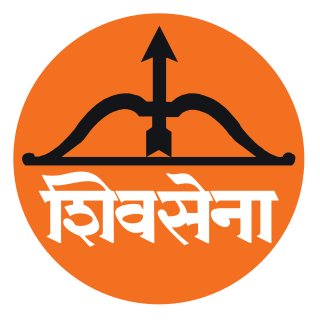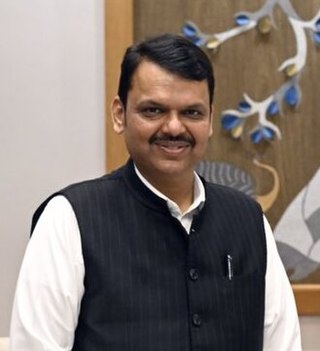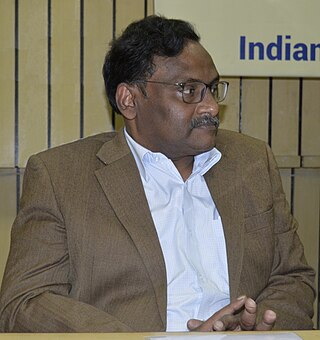Related Research Articles

Maharashtra is a state in the western peninsular region of India occupying a substantial portion of the Deccan Plateau. It is bordered by the Arabian Sea to the west, the Indian states of Karnataka and Goa to the south, Telangana to the southeast and Chhattisgarh to the east, Gujarat and Madhya Pradesh to the north, and the Indian union territory of Dadra and Nagar Haveli and Daman and Diu to the northwest. Maharashtra is the second-most populous state in India.

Shiv Sena is a right-wing Marathi regionalist and Hindu ultranationalist political party in India founded in 1966 by Bal Thackeray. Currently led by Eknath Shinde, this party is the ruling party of the Indian state of Maharashtra since 2019. Shiv Sena's election symbol is the Bow and Arrow. It uses the saffron colour in its flag and a image of a roaring tiger.

The High Court of Bombay is the high court of the states of Maharashtra and Goa in India, and the union territory of Dadra and Nagar Haveli and Daman and Diu. It is seated primarily at Mumbai, and is one of the oldest high courts in India. The High Court has circuit benches at Nagpur and Aurangabad in Maharashtra and Panaji, the capital of Goa.
The Maratha caste is composed of 96 clans, originally formed in the earlier centuries from the amalgamation of families from the peasant (Kunbi), shepherd (Dhangar), blacksmith (Lohar), carpenter (Sutar), Bhandari, Thakar and Koli castes in Maharashtra. Many of them took to military service in the 16th century for the Deccan sultanates or the Mughals. Later in the 17th and 18th centuries, they served in the armies of the Maratha Kingdom, founded by Shivaji, a Maratha Kunbi by caste. Many Marathas were granted hereditary fiefs by the Sultanates, and Mughals for their service.

Kunbi is a generic term applied to several castes of traditional farmers in Western India. These include the Dhonoje, Ghatole, Masaram, Hindre, Jadav, Jhare, Khaire, Lewa, Lonare and Tirole communities of Vidarbha. The communities are largely found in the state of Maharashtra but also exist in the states of Madhya Pradesh, Gujarat, Karnataka, Kerala and Goa. Kunbis are included among the Other Backward Classes (OBC) in Maharashtra.
Reservation is a system of affirmative action in India created during the British rule. It provides historically disadvantaged groups representation in education, employment, government schemes, scholarships and politics. Based on provisions in the Indian Constitution, it allows the Union Government and the States and Territories of India to set reserved quotas or seats, at particular percentage in Education Admissions, Employments, Political Bodies, Promotions, etc., for "socially and educationally backward citizens."
The Khairlanji massacre was the murder of four Scheduled Caste citizens by villagers of Khairlanji on 29 September 2006. The killings took place in the small Indian village of Khairlanji (Kherlanji), located in the Bhandara district of the state of Maharashtra.

The 1994 Gowari stampede occurred at Nagpur, India on 23 November 1994 in which 114 people from the Gowari community were killed and 500 more injured. Nagpur Police were trying to disperse almost 50,000 Gowari protesters using a baton charge but it created panic and triggered a stampede amongst the protesters. Gowaris are an ethnic group of central India and are predominantly present in Nagpur. The majority of casualties were women and children who were crushed to death under the crowd's feet as they scrambled to escape the police line. Some were victims of barbed wire piercing as they were climbing over high fences to escape. The Maharashtra state government appointed the one-man Justice S S Dani Commission to investigate the event, but it held nobody responsible and referred to the tragedy as an "unfortunate" one. The Commission justified the police action of baton-charge to control such a huge crowd. The commission also cleared state Chief Minister Sharad Pawar and the rest of the government for any responsibility in the incident. Maharashtra's Tribal Development Minister Madhukar Pichad later resigned, accepting moral responsibility for the tragedy.

Maharashtra is a state in the western region of India. It is India's second-most populous state and third-largest state by area. The region that comprises the state has a long history dating back to approximately 1300–700 BCE, although the present-day state was not established until 1960 CE.
Child sexual abuse laws in India have been enacted as part of the child protection policies of India. The Parliament of India passed the 'Protection of Children Against Sexual Offences Bill (POCSO), 2011' regarding child sexual abuse on 22 May 2012, making it an Act. A guideline was passed by the Ministry of Women and Child Development, India. The rules formulated by the government in accordance with the law had also been notified on the November 2012 and the law had become ready for implementation. There have been many calls for more stringent laws.

Devendra Gangadharrao Fadnavis is an Indian politician who is serving as the Deputy Chief Minister of Maharashtra from 30 June 2022 alongside Ajit Pawar who was sworn in as the Deputy Chief Minister of Maharashtra for the 5th time on 2 July 2023. He also served as the 18th Chief Minister of Maharashtra from 31 October 2014 to 12 November 2019, Leader of the Opposition, Maharashtra Legislative Assembly from 2019 to 2022 and the President of BJP, Maharashtra state unit from 2013 to 2015. Having been sworn in at the age of 44, he is the second-youngest Chief Minister in Maharashtra's history after Sharad Pawar. He served a 5-day long second term as Chief Minister during the 2019 Maharashtra political crisis, before resigning on 28 November 2019. A member of the Bharatiya Janata Party and the Rashtriya Swayamsevak Sangh, Fadnavis has represented the Nagpur South West constituency in the Maharashtra Legislative Assembly since 2009 and Nagpur West from 1999 to 2009. He was also Mayor of Nagpur from 1997 to 2001.

The Maratha Kranti Morcha, loosely translated as "Maratha revolutionary demonstration" in the Marathi language, is a series of silent and pragmatic protests organized by the Maratha community in various cities across India as well as overseas. Other groups, such as religious minorities including Muslims, have also supported the Morcha. The impetus for the rallies was the rape and murder of a 15-year-old girl in Kopardi village, Maharashtra, on 13 July 2016. The protesters have demanded the death sentence for the rapists. Maratha caste dominate the power and cultural structure in Maharashtra owing to their numerical strength.
Youth For Equality is an Indian organisation against caste-based policies and reservations, i.e. affirmative action. It was founded by students in a number of Indian universities in 2006. It organises demonstrations and legal challenges against caste-based policies.
Revati Mohite Dere is a judge in the Bombay High Court, India. She has written a number of significant judgments in relation to criminal procedure and police investigations in India, including cases concerning press freedom to report on criminal trials, death penalty sentences for repeated offences, and accountability within the police for false and improper investigations.
Sadhana Sanjay Jadhav is a former judge of the Bombay High Court, in Maharashtra, India. Jadhav has been the judge in a number of notable cases concerning criminal offences, including the death of Sheena Bora, the Adarsh Housing Society scam, the trial of Bollywood actor Sanjay Dutt in relation to the 1993 Bombay bombings, the case concerning the suicide of medical resident Payal Tadvi, and the case concerning the murder of writer Govind Pansare. Jadhav is also responsible for several legally significant interpretations of criminal law and procedure, concerning the right to appeal, and regarding penalties under the Scheduled Caste and Scheduled Tribe Act 1989.
Anuja Prabhudessai is a judge of the Bombay High Court, in Maharashtra, India. She is the first woman from Goa to be a High Court judge in India.
Swapna Sanjiv Joshi is a sitting judge in the Bombay High Court in Maharashtra, India. Joshi attracted public attention after a fellow judge, Brijgopal Harkishan Loya, died under mysterious circumstances after attending her daughter's wedding in Nagpur. Joshi subsequently recused herself from hearing a case concerning allegations of poisoning in relation to Loya's death.
Pushpa Virendra Ganediwala is an Indian lawyer. She was previously an additional judge of the Bombay High Court, but resigned in 2022, after the Supreme Court of India took the unusual step of refusing to confirm her appointment to the High Court as permanent, after she delivered several controversial judgments concerning cases of sexual assaults against women and children.
Mridula Bhatkar is a former judge of the Bombay High Court, in Maharashtra, India, serving on the court between 2009 and 2019. She adjudicated in several notable cases during her tenure as a judge, including the Jalgaon rape case, the 2006 Mumbai train bombings, and the conviction of Gujarat police officers and doctors in the 2002 gangrape of Bilkis Bano.

Gokarakonda Naga "G. N." Saibaba is an Indian scholar, writer, human rights activist, and former assistant professor.
References
- 1 2 3 "JUSTICE SMT. BHARATI DANGRE". Bombay High Court. Archived from the original on 30 September 2020.
- ↑ "Bombay High Court Confirms Maratha Quota, But Says 16% Not Justifiable". NDTV.com. Retrieved 6 October 2020.
- ↑ Saigal, Sonam (27 June 2019). "Bombay High Court upholds reservation for Maratha community". The Hindu. ISSN 0971-751X . Retrieved 6 October 2020.
- ↑ "Why the Bombay HC Judgment on Maratha Reservation Is Inherently Flawed". The Wire. Retrieved 6 October 2020.
- ↑ "Bombay high court upholds Maratha quota, caps it at 13%". Hindustan Times. 27 June 2019. Retrieved 6 October 2020.
- ↑ Correspondent, Legal (11 September 2020). "Relaxation of 50% cap on reservation for Marathas in Maharashtra unwarranted, rules SC". The Hindu. ISSN 0971-751X . Retrieved 6 October 2020.
- ↑ "Maratha Quota: Maha Govt Files Plea in SC for Review of Stay Order". TheQuint. 21 September 2020. Retrieved 6 October 2020.
- ↑ author/lokmat-english-desk (1 October 2020). "Maratha morcha workers issue ultimatum to govt, call for Maharashtra Bandh on Oct 10 | english.lokmat.com". Lokmat English. Retrieved 6 October 2020.
{{cite web}}:|last=has generic name (help) - ↑ "If accused charged under POCSO, SC/ST Act, offences can be tried only by special POCSO court: Bombay HC". The Indian Express. 7 July 2020. Retrieved 6 October 2020.
- ↑ PTI (6 July 2020). "POCSO Act has overriding effect on any other law: Bombay HC". Outlook India. Archived from the original on 9 October 2020. Retrieved 6 October 2020.
- ↑ "Pocso Act applies only when a child is harassed with sexual intent: Bombay HC". Hindustan Times. 12 September 2020. Retrieved 6 October 2020.
- ↑ "Holding hand of minor to express love, inadvertent physical touch without sexual intent not assault under POCSO: HC". The Indian Express. 27 December 2020. Retrieved 28 December 2020.
- ↑ "Bombay High Court says GST not tax-friendly, tells government to put requisite mechanism in place". Firstpost. 12 February 2018. Retrieved 6 October 2020.
- ↑ Plumber, Mustafa (10 February 2018). "Bombay High Court tells Centre and Maha government to set up grievance mechanism for easy filing of GST tax". DNA India. Retrieved 6 October 2020.
- ↑ PTI (12 February 2018). "GST not tax-friendly, put requisite mechanism in place: HC". Outlook India. Retrieved 6 October 2020.
- ↑ "GST not a tax-friendly regime: HC". The Hindu. 10 February 2018. ISSN 0971-751X . Retrieved 6 October 2020.
- ↑ Sikarwar, Deepshikha. "GST regime not user-friendly, says Bombay High Court". The Economic Times. Retrieved 6 October 2020.
- ↑ "Tax department to set up GST grievance redressal system". The Financial Express. 21 February 2018. Retrieved 6 October 2020.